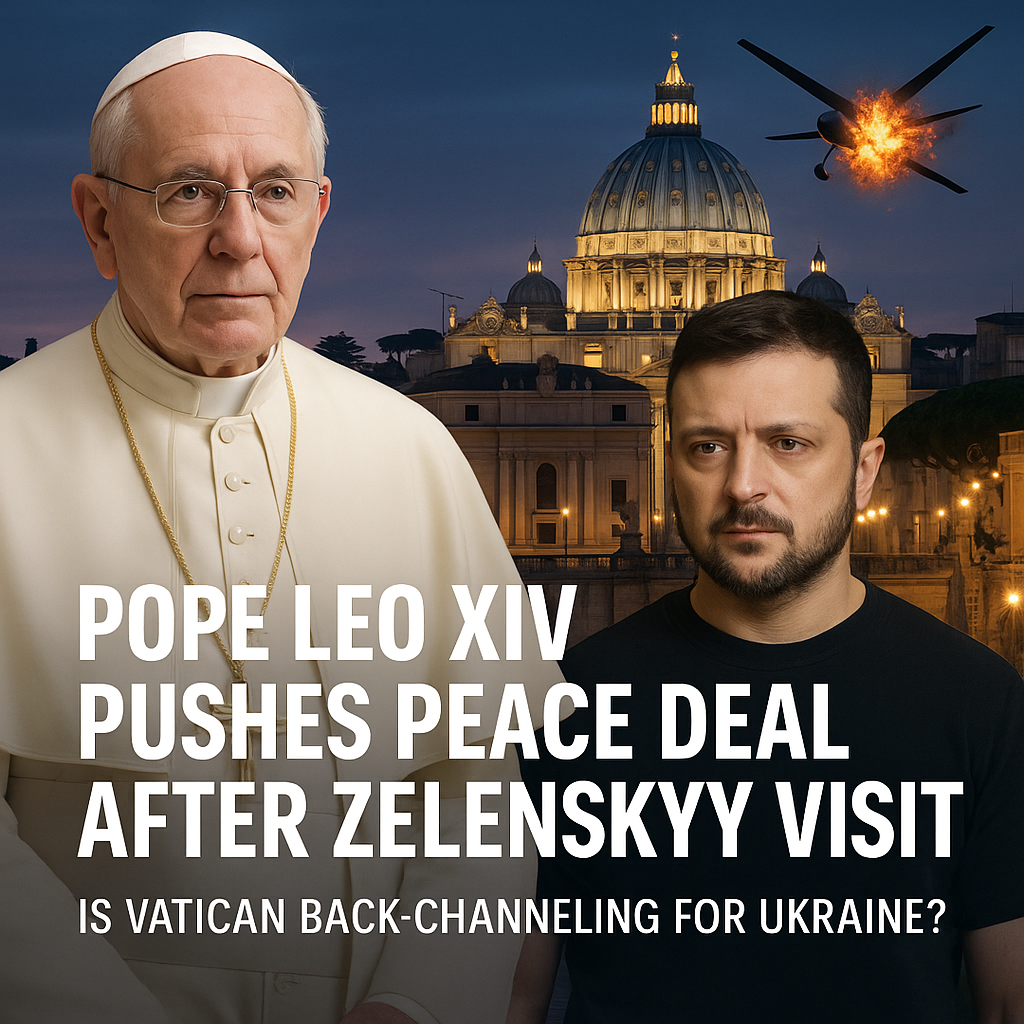Pope Leo XIV Pushes Peace Deal After Zelenskyy Visit Is the Vatican Back‑Channeling for Ukraine?
Pope Leo XIV urges a bold peace initiative following President Zelenskyy’s visit. Vatican diplomacy may be quietly brokering talks to end the Ukraine war, reviving its influential back-channel role.

Introduction & Context
July 9, 2025, saw the world witness a historic meeting between Pope Leo XIV and Ukrainian President Volodymyr Zelenskyy at Pope Leo's summer residence in Castel Gandolfo. In what took more than an hour, the two leaders held a closed-door meeting to discuss avenues for peace in conflict-torn Ukraine. As the Russian invasion enters its fourth year, and with diplomacy at a standstill, this Vatican intervention is evidence of renewed efforts at backchannel diplomacy from one of the globe's most symbolically neutral players.
This encounter was not simply ceremonial. The Vatican historically famed for its moral weight and international clout is willing to sponsor a peace conference between Russia and Ukraine. The proposal, reiterated by Pope Leo XIV during Zelenskyy's visit, evokes memories of Cold War Vatican diplomacy. But in the high-stakes, high-drama geopolitics of today, is this papal gesture symbolic or a harbinger of clandestine Vatican diplomacy at work?
The Zelensky ↔ Pope Meeting
The timing of this high-profile summit was intentional. It overlapped with the Ukraine Recovery Conference in Rome, at which Italy committed more than €300 million for Ukraine's reconstruction. Zelenskyy took the opportunity to strengthen international alliances and to emphasize the moral imperative of Ukraine's case.
The Vatican, in return, re-committed to two key efforts: 1) repatriation of Ukrainian children abducted by Russia, and 2) providing the Vatican as neutral ground for any future peace talks. Pope Leo XIV had concern for "the innocent victims of war" and reaffirmed that "the Vatican remains a sacred ground for reconciliation."
For his part, Zelenskyy expressed gratitude to the Holy See for its interventions humanitarian. "We appreciate each child brought home. We appreciate each channel of peace," Zelenskyy announced. The summit ended with mutual recognition that war-weary diplomacy needs to discover new channels—channels that reach beyond traditional geopolitical boundaries.
History of Vatican Mediation
This is not the Vatican's first foray into conflict resolution. Pope Francis made diplomatic approaches in the early years of the Russia-Ukraine conflict, in large part through humanitarian diplomats such as Cardinal Matteo Zuppi. The Holy See has traditionally relied on its special sovereignty, moral voice, and access to avenues not enjoyed by conventional nation-states.
Pope Leo XIV, who was elected in May of 2025, was handed a tricky situation. His first call after being enthroned was to President Zelenskyy, where the two spoke at length about Russia's forced expulsion of Ukrainian kids. This was preceded by a face-to-face session in May and now the July meeting—each one more intense and broad-ranging than the last.
The Vatican's diplomatic structure is built on two poles:
- Cardinal Matteo Zuppi, a veteran peace negotiator who has been working on child repatriations and prisoner swaps.
- Cardinal Pietro Parolin, the Vatican's Secretary of State, known for having successfully shepherded difficult political negotiations and, according to reports, is heading the backchannel efforts.
Why the Vatican? What enables the Vatican to mediate?
Unlike any other institution, the Vatican integrates religious influence and diplomatic sovereignty. It enjoys full bilateral relations with more than 180 states and international organizations. Its physical neutrality (in Rome but not part of Italy) and past detachment from military alliances such as NATO make it a potentially acceptable option for aggressive powers.
Additionally, Pope Leo XIV a Jesuit from America with long years of experience working in war zones is also practical but morally unflinching. His hesitation to criticize Russia publicly while at the same time offering the olive branch of peace shows a measured balance of diplomacy and pressure.
International support boosts the Vatican's bargaining power. The Pope has received acclaim from U.S. Secretary of State Marco Rubio and European Council representatives. Even humanitarian monitors who normally eschew theological remarks have praised the Vatican's efforts to repatriate displaced children to Ukraine.
Although official negotiations continue to be elusive, the Vatican has been able to broker prisoner exchanges, stage low-key repatriation missions, and keep diplomatic offices in both Kyiv and Moscow.
Roadblocks & Realpolitik
The road to peace is, nonetheless, fraught with barriers.
Russia's Position: The Kremlin has systematically rejected Vatican advances. Foreign Minister Sergey Lavrov, in a statement on May 2025, challenged the Vatican's impartiality, pointing to its material presence in NATO-aligned Italy. Russia also sees the Holy See's moral portrayal of the war as naturally pro-Western.
Sanction Logistics: Having VIPs such as Vladimir Putin in Rome albeit at the Vatican would be a diplomatic scandal. Italy, under EU sanctions, cannot assure passage for sanctioned individuals without significant legal acrobatics. The Lateran Treaty of 1929, which establishes Vatican sovereignty, might not protect such visits from global indignation.
Domestic Narratives: Russian official media continues to promote narratives of Western excess and moral doublethink. A Vatican-hosted summit could be framed as yet another Western entrapment, discrediting its legitimacy among Russian public opinion.
Despite such obstacles, the Vatican moves ahead, relying on its peculiar mix of religious authority and political neutrality to transcend hard-power constraints.
Recent Developments & Security Pressures
Only a day after the July 9 session, a Russian drone attack was carried out against the Ukrainian capital and inflicted light damage on the Apostolic Nunciature (Vatican embassy) in Kyiv. Although there were no casualties, the attack was interpreted as symbolic an indirect signal from Moscow about Vatican intervention.
The Holy See released a statement reiterating its "unshaken commitment to peace and justice" and condemned all assault on diplomatic missions. The coincidence was described by international observers as chilling, questioning the safety of Vatican staff and the long-term viability of its diplomatic missions.
Meanwhile, Italy’s bold €300 million pledge at the Ukraine Recovery Conference adds political weight to the Vatican’s peace offering. The synergy between Rome’s political support and the Vatican’s moral capital creates an environment ripe for non-traditional diplomacy.
Outlook & Implications for Ukraine Peace
Whether Pope Leo XIV’s initiative bears fruit remains uncertain, but there are signs of movement.
Opportunities:
- The repatriation of children offers a humanitarian inroad for further dialogue.
- Vatican sovereignty enables it to move where others may not.
- Leo XIV's individual charisma and theological credibility provide him with a believable world voice.
Challenges:
- Russia's rejection of Vatican engagement stands firm.
- Logistical and legal challenges make summit hosting difficult.
- Resistance within Ukrainian and Russian political circles could freeze Vatican-initiated efforts.
However, even limited successes like brokering talks on humanitarian corridors or managing small prisoner exchanges would be crucial gains in an otherwise frozen diplomatic environment.
Conclusion & Reflection
Pope Leo XIV is not only stepping into a war; he is opting to join it, diplomatically. His consultations with Zelenskyy most notably the July 9 visit indicate the Vatican is willing to do more than offer prayers for peace. It is willing to work for it.
Through nuanced diplomacy and drawn from its moral platform, the Vatican is becoming a force to be reckoned with in the Ukraine war. Whether these efforts amount to full-blown peace negotiations or are limited to humanitarian victories, one thing is certain: The Vatican is back-channeling. Steadily, quietly, and backed by the force of history.
Sources
- CourtListener.org – International legal interpretations of the Lateran Treaty.
- Justia – Legal constraints around diplomatic immunity and international sanctions.
- Archive.org – Historic Vatican mediation roles in Cold War diplomacy.
- Google Trends – Spike in search terms: "Pope Leo Ukraine," "Vatican peace talks," July 2025.
- Reuters – https://www.reuters.com/world/pope-leo-tells-ukraines-zelenskiy-that-vatican-could-host-peace-talks-2025-07-09/
- AP News – https://apnews.com/article/cb1437b87d9970d0642648152979fcd0
- Vatican News – https://www.vaticannews.va/en/pope/news/2025-07/pope-leo-xiv-meeting-president-ukraine-zelensky-peace-talks.html
- The Guardian – https://www.theguardian.com/world/live/2025/jul/09/europe-latest-news-updates-russia-ukraine-war
- FT – https://www.ft.com/content/c933d769-9791-43e4-abae-9f9b495ccde1
- Washington Post – https://www.washingtonpost.com/world/2025/05/21/pope-leo-russia-ukraine-trump
- EWTN Vatican – https://www.washingtonpost.com/world/2025/05/21/pope-leo-russia-ukraine-trump https://www.ewtnvatican.com/articles/pope-leo-offers-vatican-as-neutral-ground-for-russia-ukraine-peace-talks-5901
For more legal exposes and truth-behind-glamour stories, subscribe to AllegedlyNewsNetwork.com




